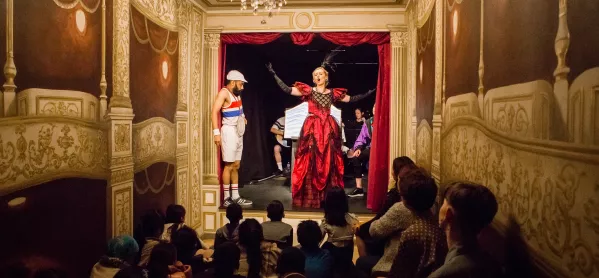Why opera can play an important role in schools

Over the past 50 years, Scottish Opera has made thousands of visits to schools throughout Scotland. We have witnessed first hand how engagement with opera in schools can help young people to realise their own creativity, while also supporting learning in myriad subjects.
This is nothing new. Eighty years ago the Hadow Report of 1931 stated the importance of music in school life: “Of music we need say nothing here except to indicate that we count it among the indispensable elements of the primary school curriculum”.
Yet, here we are in 2021, having to justify and fight for its role in the education of our young people.
After lockdown: An outdoor stage has been fantastic for our school
Covid: ‘Impassioned plea’ to teachers to keep pupils singing
Music lessons: Covid’s impact on music teaching revealed
Archive interview: Scottish Opera’s education director
I’m often asked how children can relate to such an “old-fashioned” and “complex” art form, with its puzzling plots often sung in a foreign language. The answer is that, far from being alienating, opera is at its core the stuff of life. People of all ages can relate to its universal themes of love, loss and finding one’s place in the world. Its sweeping and emotive “heart on your sleeve” plots serve as an ideal catalyst for developing self-reflection, tolerance and empathy in the classroom.
Opera in schools: Exploring universal themes
We know that the arts have the power to resonate and connect with people of all backgrounds and abilities. Well, opera is multi-disciplinary and arguably the most complete art form. It provides a wealth of opportunities for young people to learn and participate through music, drama, dance, words and art.
You can take a concept from opera and use it to develop a child’s capacity to make connections - connections with their peers and teachers through performance, but also with thoughts and concepts. It offers so many ways for us to tap into a number of curriculum subjects from drama and literature to art and foreign languages.
And when you delve a little further, opera can also be used as a jumping off point to explore world history, science, technology ethics and more. In our most recent schools project, we have used opera as a lens for exploring topics from maths and virology to healthy eating and climate change.
Our Primary Schools Tour works across a range of classroom subjects - science, maths, technology, literature, history - giving teachers and pupils the chance to explore and discuss various topics while learning songs and movement and creating props and costumes. All this culminates in a performance with Scottish Opera artists.
And, like a rollercoaster ride, the experience of performing is hugely enjoyable: exciting and terrifying in equal measure. It also boosts pupils’ own particular strengths, whether as scientist, writer, artist, organiser, reader, mediator, activist, linguist, singer or dancer.
Never has it been so crucial to help young people to build emotional strength and resilience. They have had monumental issues to overcome in the past year of the Covid pandemic: social isolation, fear of infection, threat of severe illness to the older generations around them.
Positive musical experiences are needed more than ever right now, and we’ve been adapting our work during the pandemic - see one example here - to ensure that we continue to provide creative inspiration and support to young people across the country. Last year we produced our first-ever online interactive opera for children, Fever!, reaching children both in the UK and internationally, and this week we’ve launched a series of digital primary school initiatives - the first time we’ve offered schools a package of projects for all primary-aged pupils at the same time.
As we navigate the pandemic and steer towards recovery, we will continue to share stories and experiences through music - remaining committed to our mission to show all young people the richness of opera.
Jane Davidson is Scottish Opera’s director of outreach and education
Resources for Scottish Opera’s Opera for Schools programmes, including new projects The Brassketeers for Primary 1 to 3 and The Last Aliens for Primary 5 to 7, are available here.
You need a Tes subscription to read this article
Subscribe now to read this article and get other subscriber-only content:
- Unlimited access to all Tes magazine content
- Exclusive subscriber-only stories
- Award-winning email newsletters
Already a subscriber? Log in
You need a subscription to read this article
Subscribe now to read this article and get other subscriber-only content, including:
- Unlimited access to all Tes magazine content
- Exclusive subscriber-only stories
- Award-winning email newsletters